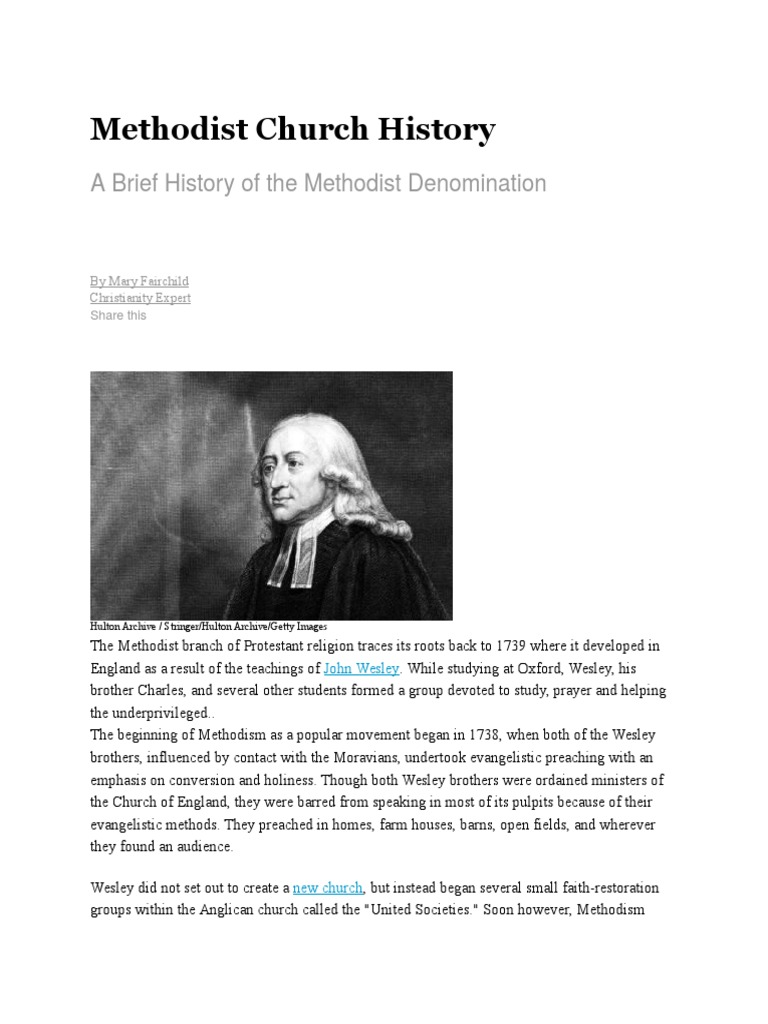The Methodist Church, a vibrant expression within the vast spectrum of Christianity, is notable not only for its theological underpinnings but also for its rich historical narrative. The origins of Methodism can be traced back to the 18th century as a movement within the Church of England. However, its trajectory diverged significantly, leading to the establishment of a distinct denomination that emphasizes grace, social justice, and community engagement.
At the heart of the Methodist ethos lies the influential figure of John Wesley. Wesley, an Anglican cleric, initially sought spiritual renewal within his own tradition. His methodical approach to faith—marked by small group meetings, extensive preaching, and a distinct emphasis on personal piety—became the cornerstone of what would later develop into the Methodist movement. Wesley’s insistence on a transformative experience of faith led to the idea that salvation is available not only as a one-time event but as a continuous journey of growth and sanctification, a concept that remains central to Methodist belief today.
The historical context is pivotal to understanding Methodism’s emergence. The 18th century was a time of tumult and change in England. Rapid industrialization and social upheaval created a landscape ripe for new religious expressions. Methodism offered an alternative to the formalism of the Anglican Church and catered to those who felt marginalized in a society that often overlooked the impoverished and disenfranchised. With its focus on evangelism, social reform, and community, Methodism grew rapidly, leading to a significant schism within the Anglican communion.
Methodism’s theological foundation is deeply rooted in a system of beliefs commonly referred to as the “Wesleyan Quadrilateral.” This framework consists of Scripture, tradition, reason, and experience as the touchstones for understanding faith. Scripture holds primacy in addressing the ethical and doctrinal stances of the church. Tradition provides a historical lens through which believers can examine their faith, while reason encourages critical thinking and intellectual engagement with theological questions. Lastly, experience underscores the importance of personal encounters with God, varying in manifestation from individual to individual.
One characteristic that differentiates Methodist beliefs from other Christian denominations is the doctrine of prevenient grace. This notion asserts that God’s grace is accessible to everyone, preceding one’s conscious acceptance of faith. It presents a more inclusive understanding of salvation, inviting all individuals to explore their faith journey without the confines of predestined limitations. As such, Methodism extends a welcome to those who may feel unworthy of God’s love, reinforcing the idea that grace—not works—is the impetus for salvation.
Sanctification, or the process of becoming more like Christ, is another cornerstone of Methodist theology. Wesley advocated for a second work of grace, often referred to as entire sanctification, where an individual reaches a state of holiness through God’s empowering grace. This belief in progressive holiness compels Methodists to actively participate in faith formation, striving to embody Christ-like attributes in daily life.
Worship in the Methodist Church reflects a blend of traditional and contemporary practices, underscored by a desire for meaningful community engagement. Methodists often gather for services characterized by liturgical elements, including hymns, readings from Scripture, and prayers. The use of hymns is particularly significant, as it has been an integral method of conveying theological truths and fostering a sense of communal identity. The prolific contributions of Charles Wesley, John’s brother, to hymnody have enriched the Methodist tradition profoundly.
In addition to vibrant congregational worship, a hallmark of the Methodist Church is its commitment to social justice and activism. The church’s history has continually illustrated a prophetic voice advocating for the marginalized and oppressed. From issues such as abolition and women’s rights to modern movements addressing poverty and environmental stewardship, the Methodist witness challenges believers to incarnate their faith through tangible actions that reflect Christ’s love in the world.
Methodism also places a significant emphasis on small group fellowship. Known as “class meetings” or “share groups,” these gatherings provide a space for accountability, support, and personal growth in faith. The Methodist community is often characterized by a familial atmosphere where individuals engage in open dialogue about their spiritual journeys, fostering a sense of belonging and mutual encouragement.
Through its unique blend of tradition and innovation, theology and practice, the Methodist Church stands as a powerful testament to the ongoing work of Christ in the world. Its commitment to inclusivity, personal transformation, and social advocacy invites curiosity and invites believers to think critically about their understanding of faith within modern contexts.
In closing, the Methodist Church offers an intriguing exploration of Christian faith, challenging individuals to consider how grace, community, and service intertwine in the tapestry of belief. For those seeking a faith that not only nurtures personal spirituality but also compels action towards justice and love, Methodism remains a compelling avenue for exploration. Embracing both historical richness and contemporary relevance, it invites a deeper engagement and reflection on what it means to live out one’s faith in a complex world.



